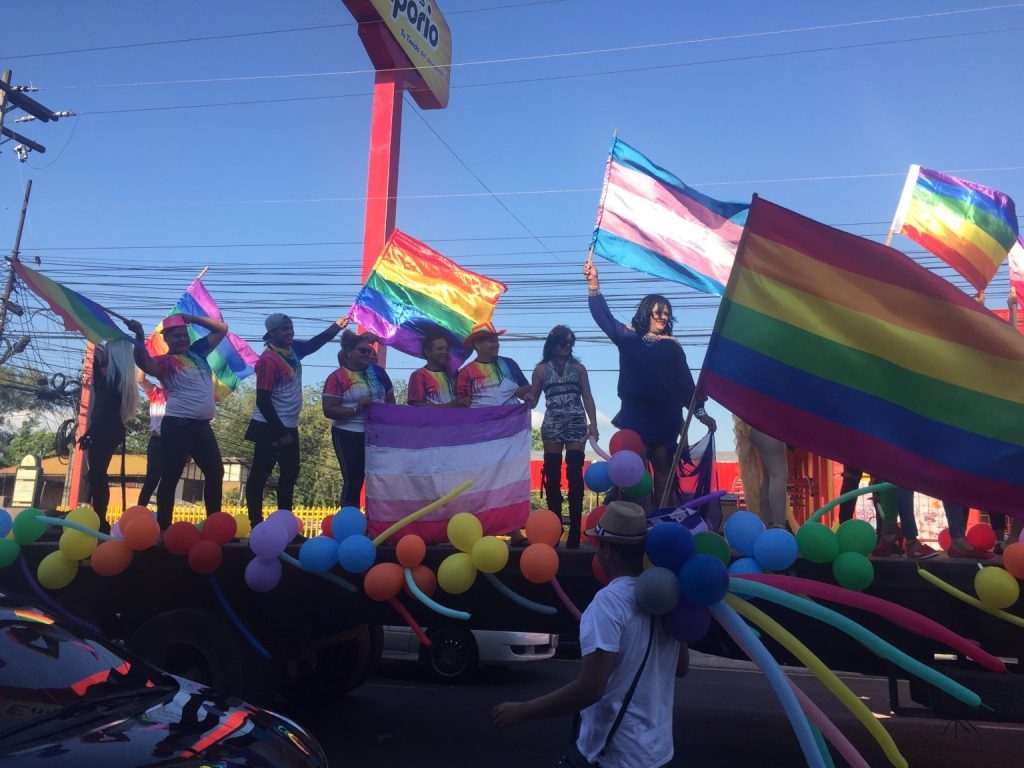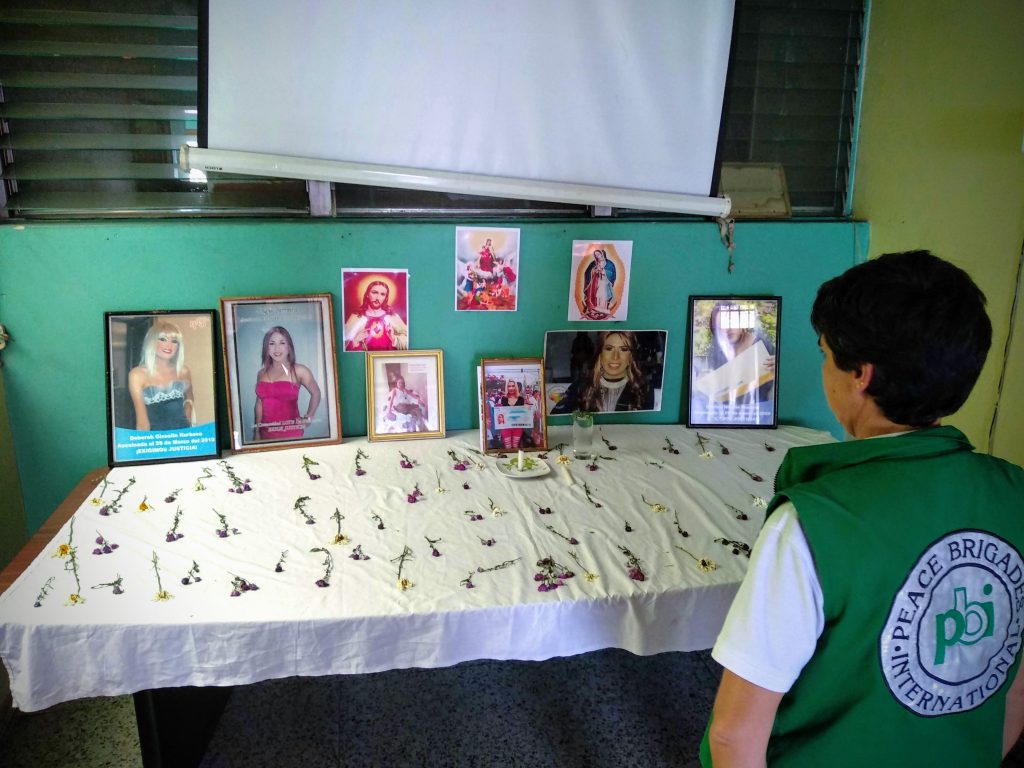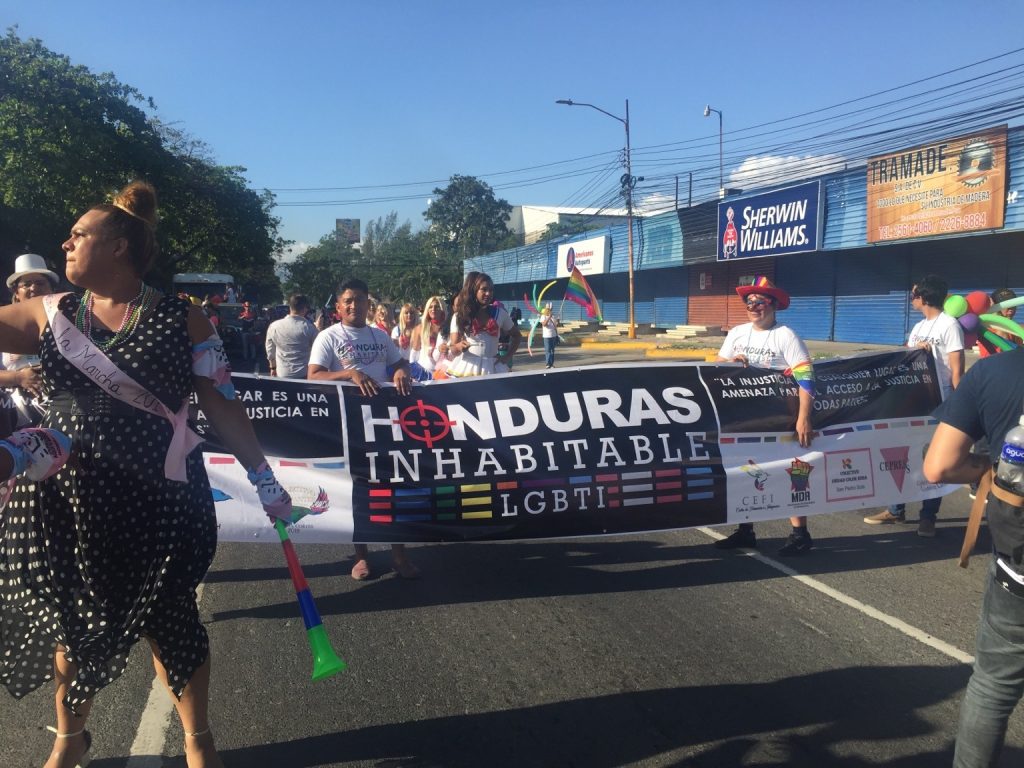Español abajo
The situation for Honduras’s LGBTQI+ community was already critical before the current health emergency, but the arrival of COVID-19 to this Central American country has led to a double violation of their rights. This is how the Arcoiris LGBT Association describes their situation, explaining that the coronavirus pandemic has had a greater impact on the most vulnerable sectors of the population.
The Sexual Diversity Committee states that those who identify as Lesbian, Gay, Bisexual, Transgender, Queer, Intersex or other (LGBTQI+) “are disproportionately suffering from the ravages of the pandemic and its consequences due to their historic social, labour and economic exclusion under the Honduran state”[1]. Due to the restrictions imposed by the Honduran Government, which declared a complete lockdown throughout the country and the suspension of constitutional guarantees on 20 March, those with less resources find it increasingly difficult to access essential services, from personal protective equipment to food and water.
The main problem, according to Donny Reyes, coordinator of Arcoiris Association, “is that the LGBT collective is not considered a priority group in the distribution of government aid. Other groups, like over-60’s and the disabled are given priority”. Arcoiris is therefore working to find food, housing support and biosecurity materials like bleach, soap, gloves and masks to help the LGBTQI+ collective. In order to raise the necessary funds, Arcoiris has requested humanitarian aid. “But at the moment, it is not going very well for us”, they explain.

So far, they have managed to obtain a few parcels of food aid from the Secretary of Development and Social Inclusion with the support of the National Human Rights Commissioner, though not without great difficulty. However, even when they get food aid, the problems do not end there. “We leave the parcels at strategic points because we are not permitted to be in the streets, and we can’t go door to door. But the people often do not have the means to travel, either because there is no public transport or because they cannot afford a taxi. We’ve heard that some of the parcels we left were stolen. On top of that, delivering the parcels is becoming more and more difficult and complicated. When someone from our group goes out to deliver the parcels, we’re afraid that something bad could happen to them. How can we guarantee the safety of the teams that move about the city?”
Currently, obtaining a travel permit in Honduras for members of national and international human rights or humanitarian aid organisations is a long and complicated process. In fact, many organisations denounce that the Honduran state is minimising the work of human rights defenders, as they were not included in the list of exceptions to the lockdown. This closes their spaces for action, and blocks their fundamental work in this critical situation of suspended guarantees.[2] “On top of this, they’re not giving travel permits to any LGBT organisation in the country, because it would be an official recognition and accreditation of our work,” says Donny Reyes.
In order to obtain the travel permit and continue their human rights defence work, Arcoiris Association, together with other civil society organisations in Honduras, have launched a legal appeal to restore the right to freedom of movement and freedom of expression for human rights defenders. In other words, to restore the right to defend rights.
A Greater Risk
Within this context, the risks faced by transgender women have increased hugely. “I am worried for my friends, because many of them go outside to work when there is a lockdown”, one member of the Muñecas Trans Women’s Collective of Arcoiris comments. The lack of work opportunities means that sex work in the streets of Tegucigalpa is one of the very few options this group has to make a living. In the midst of a pandemic and its restrictions, they must break the quarantine order and risk being arrested or becoming victims to violence.
In recent weeks, we have received reports of at least 10 attacks against trans women by soldiers, the National Police and private security agents, including verbal and physical attacks, threats and the use of tear gas. “They take advantage of the fact that we are violating the lockdown order to threaten us and hit us. But we need to pay our rent and buy food. Going out on the street is our only option”, says Adriana (not her real name), a trans woman who recently suffered an attack by soldiers in the centre of Tegucigalpa. Some of them have even reported being coerced into performing sexual acts in order to avoid being arrested.
On 5 May, Honduras recorded its first hate crime during the health emergency when a 23 year old trans woman in the Caribbean city of La Ceiba was murdered[3]. Although the arrival of COVID-19 has intensified the violence against the LGBTQI+ collective, this is not a new development. According to the Observatory of Violent Deaths of the LGBTI Community in Honduras, part of the Cattrachas Lesbian Network, so far in 2020 there have been at least six murders of LGBTQI+ individuals, one trans woman among them. Over the past ten years, organisations have reported over 315 hate crimes, of which almost a third were against trans persons. Of all these crimes, 92% remain unpunished.

Alongside the fear of being arrested or violently attacked, accessing health services has become even more difficult during the lockdown. This is particularly worrying for people living with HIV/AIDS, who have a compromised immune system. Arcoiris and the Muñecas collective are concerned. “Our HIV positive members do not have the means to travel to pick up their medicines, firstly due to the lack of transportation, and secondly because the trans women do not have identification and it’s very risky to leave the house like this. The few women who manage to get their medication can’t take it in the end, because they need to be taken with food, and the vast majority of them don’t have access to food right now”.
Facing this situation, trans women, who already regularly experience situations of violence, discrimination, and a generalised hostility, are now more than ever looking to one another for support and companionship in order to lower their risk.
Meanwhile, the UN Office of the High Commissioner for Human Rights has reminded states on numerous occasions since the start of the outbreak that the emergency must not be used as a pretext for abuses and violations of human rights, emphasising all the while the importance of protecting LGBTQI+ individuals. Yet according to LGBTQI+ organisations, the Honduran Government does not seem to be implementing these recommendations.[4]
Note: Since the writing of this article, Arcoiris has reported the murder of yet another trans human rights defender. Scarlet Cambel, a member of the Association’s Muñecas trans women’s group, was killed by unknown assailants in central Tegucigalpa in a shooting on 10 July. The murder occurred one year after the similar killing of Arcoiris trans rights defender, Bessy Ferrera. Prior to her death, Cambel reported several physical assaults from state and private security forces.
[1]http://www.pasosdeanimalgrande.com/index.php/en/denuncias/item/2789-segun-comite-de-la-diversidad-sexual-en-honduras-poblacion-lgtbi-esta-en-situacion-de-calamidad-en-la-emergencia-por-covid-19
[2] http://www.pasosdeanimalgrande.com/index.php/en/contexto/item/2802-emergencia-covid-19-defensores-de-ddhh-exigen-salvoconductos-para-atender-a-las-victimas-de-violaciones-a-derechos-fundamentales
[3]https://agenciapresentes.org/2020/05/05/lapidaron-a-una-mujer-trans-en-honduras-tenia-23-anos/
[4] https://acnudh.org/load/2020/04/LGBTIpeople_ES-1.pdf
La Doble Vulneración de Derechos para las Mujeres Trans bajo el Toque de Queda Hondureño
Si la situación de la comunidad LGTBIQ+ en Honduras ya era crítica antes de la actual emergencia sanitaria, la llegada del COVID19 al país centroamericano se ha traducido en una doble vulneración de derechos. De esta manera resumen su situación la Asociación LGTB Arcoíris, quienes explican que la pandemia del coronavirus tiene un impacto mayor en aquellos sectores de la población que ya de antes estaban más vulnerablizados.
Desde el Comité por la Diversidad Sexual aseguran que las personas que se identifican Lesbianas, Gais, Transexuales, Bisexuales, Intersexuales, Queer u otros (LGTBIQ+) “están sufriendo los embates de la pandemia y sus consecuencias de una manera desproporcionada debido a la histórica exclusión social, laboral y por ende económica en el Estado de Honduras”[1]. Así, debido a las restricciones impuestas por el Gobierno Hondureño, quien desde el pasado 20 de marzo declaró toque de queda absoluto en todo el país y la restricción de algunas garantías constitucionales, la población con menos recursos se encuentra con mayores dificultades de acceso, no sólo a los equipos de protección, sino también a la comida y agua.
El principal problema, según explica Donny Reyes, coordinador de la Asociación Arcoíris, “es que el colectivo LGTB no es considerado prioritario en recibir la ayuda del Gobierno. Se da la prioridad a otra categorías, como personas mayores de 60 años y discapacitados”. Por eso, desde la organización están trabajando en la búsqueda de alimentos, apoyos para la vivienda e insumos de bioseguridad como cloro, jabón, guantes y mascarillas, para ayudar a la comunidad LGTBIQ+. Para ello, Arcoíris se está activando para pedir ayuda humanitaria, “pero de momento nos está yendo muy mal”, explican.

Hasta ahora, y con dificultad, han podido obtener, a través de la Secretaría de Desarrollo e Inclusión Social y con el apoyo del Comisionado Nacional de Derechos Humanos (CONADEH) algunas bolsas de ayuda alimentaria del gobierno. Pero incluso cuando lo consiguen, los problemas no acaban: “Dejamos las bolsas en puntos estratégicos porque nosotros no tenemos salvoconductos y no podemos ir casa por casa. Muchas veces las personas no tienen como movilizarse: porque no hay transporte público o porque no tienen los recursos para poder pagar a un taxi. Entonces, nos ha ocurrido que alguien se ha robado las bolsas que habíamos dejado. Encima de esto, la entrega cada vez se vuelve más complicada y peligrosa. Cuando alguien de nuestro colectivo sale para entregar las bolsas, tenemos miedo de que algo malo le pueda pasar. ¿Como podemos garantizar la seguridad del equipo que se moviliza por la ciudad?”.
Actualmente en Honduras, la obtención de un salvoconducto a los integrantes de las organizaciones, ya sean nacionales, internacionales, de DDHH o ayuda humanitaria, es un proceso largo y complicado. De hecho, son muchas las organizaciones que critican que el estado hondureño está minimizando la labor de las personas defensoras de derechos humanos, ya que no las ha incluido en las excepciones para otorgarles salvoconductos, cerrando así sus espacios de actuación y bloqueando sus labores fundamentales en esta situación crítica de suspensión de garantías[2]. “Encima de esto, no están dando salvoconductos a ninguna organización LGTB del país, porqué sería un acto oficial de reconocimiento y acreditación de nuestra labor”, comenta Donny Reyes.
Con el objetivo de conseguir el permiso para movilizarse para continuar su trabajo de defensoría de los derechos humanos, la Asociación Arcoiris, junto con otras organizaciones de la sociedad civil hondureña, han interpuesto un recurso de amparo para que se restituya el derecho a la libertad de circulación y expresión de personas defensoras. En definitiva, que se restituya el derecho a defender derechos.
Un mayor riesgo
En este contexto, aumenta de manera alarmante el riesgo que enfrentan las mujeres transexuales. “Estoy preocupada por mis compañeras, porque muchas de ellas se atreven a salir a trabajar cuando hay toque de queda”, comenta una compañera del colectivo de mujeres trans Muñecas de Arcoíris. La falta de oportunidades laborales hace que el trabajo sexual en las calles de Tegucigalpa sea una de las pocas opciones de subsistencia para este colectivo. Y en tiempos de pandemia y restricciones, deben saltarse el toque de queda arriesgándose así a la detención o actos de violencia.
En las últimas semanas, nos han reportado, al menos 10 agresiones a mujeres trans por parte de militares, Policía Nacional y agentes de seguridad privada con ataques verbales y físicos, amenazas y uso de gases lacrimógenos. “Se aprovechan de que estamos violando el toque de queda para amenazarnos y golpearnos. Pero necesitamos pagar el piso y poder comer. Salir a la calle es nuestra única opción”, comenta Adriana (nombre falso), mujer trans que fue recientemente víctima de un ataque por parte de militares en el centro de Tegucigalpa. Algunas de ellas, incluso aseguran haber sido obligadas a mantener relaciones sexuales a cambio de no ser detenidas.
El pasado 5 de mayo, el asesinato de una mujer trans de 23 años de edad en la ciudad de La Ceiba se convirtió en el primer crimen de odio durante esta crisis sanitaria[3]. Aunque la llegada del COVID19 ha intensificado la violencia contra ese colectivo, no es algo nuevo. El Observatorio de Muertes Violentas de la Comunidad LGTBI en Honduras, de la red Lésbica Cattrachas, en lo que llevamos de 2020 se han registrado, al menos, seis asesinatos de personas de la diversidad sexual, entre las que se encuentra una mujer trans. Además, en los últimos diez años, las organizaciones reportan más de 315 crímenes de odio, de los que casi un tercio corresponden a personas trans. Y del total, el 92% se encuentran en la impunidad.
Junto al temor de ser arrestadas o víctimas de violencia, el acceso a los servicios de salud se vuelve todavía más complicado durante el toque de queda, un hecho especialmente preocupante para las personas que viven con VIH/SIDA y, por lo tanto, con un sistema inmunitario comprometido. Arcoíris y el Colectivo Muñecas muestran su preocupación por la situación: “las compañeras VIH positivas no tienen forma de movilizarse para poder ir a recuperar las medicinas: primero por falta de transporte, segundo las chicas trans no tienen documentos de identidad y es muy arriesgado salir por la calle en este contexto; las pocas chicas que logran conseguir los medicamentos, tampoco pueden tomarlo al final porque son medicinas que tienen que ser tomadas con comida, y la gran mayoría de ellas en este momento no tienen acceso a alimentos”.
Ante este escenario, las mujeres trans, que ya de por si experimentan regularmente situaciones de violencia, discriminación y entornos hostiles, ahora más que nunca procuran acompañarse y apoyarse entre ellas con la intención de disminuir su riesgo.
Mientras, OACNUDH ha recordado en diversas ocasiones, desde el inicio del brote, a los estados la necesidad de que la emergencia no sirva de pretexto para abusos y violaciones de derechos humanos, resaltando siempre la importancia de proteger a las personas LGTBIQ+. Recomendaciones que, a juicio de las organizaciones de la diversidad sexual, el Gobierno Hondureño no parece implementar.[4]
[1]http://www.pasosdeanimalgrande.com/index.php/en/denuncias/item/2789-segun-comite-de-la-diversidad-sexual-en-honduras-poblacion-lgtbi-esta-en-situacion-de-calamidad-en-la-emergencia-por-covid-19
[2] http://www.pasosdeanimalgrande.com/index.php/en/contexto/item/2802-emergencia-covid-19-defensores-de-ddhh-exigen-salvoconductos-para-atender-a-las-victimas-de-violaciones-a-derechos-fundamentales
[3]https://agenciapresentes.org/2020/05/05/lapidaron-a-una-mujer-trans-en-honduras-tenia-23-anos/

